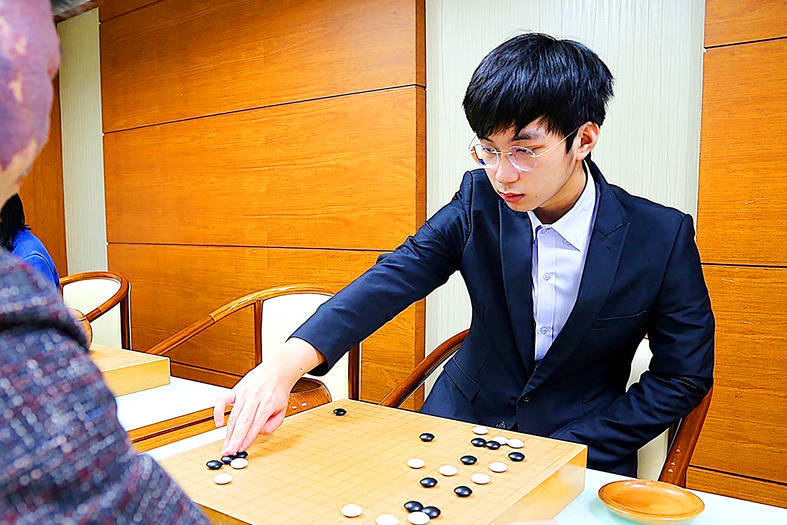《TAIPEI TIMES》 Taiwan’s go community facing strong challenges
By Chao Yen-hsiang / CNA
The unprecedented dominance shown by Taiwanese pro go player Hsu Hao-hung (許皓鋐) at home this year, winning eight of nine major domestic titles, has raised hopes that Taiwan’s 15-year title drought at top-flight international go events could finally end.
Can Taiwan give Hsu what he needs to accomplish that goal?
The battle is not only an individual one, but also a collective one, said Chou Chun-hsun (周俊勳), the only go player representing Taiwan to ever capture a major international title with a win at the 2007 LG Cup.
Pro go players in Taiwan are blessed because they have many more resources to draw on than before, but the game’s development in the nation still faces many challenges, Chou said.
The biggest roadblock is the lack of local elite pro go players compared with the multitude of top players in the three go powerhouses — China, South Korea and Japan.
Having more go stars means their players have more opportunities to hone their skills against high-level opponents, Chou said.
“China has go legend Ke Jie (柯潔) because it has 50 go players like Hao-hung. South Korea has Shin Jin-seo — the No. 1 go player in the world — because it has 30 Hao-hungs. And Japan has Yuta Iyama because it has 20 Hao-hungs,” he said.
Chou, the head coach of Taiwan’s go team that is to compete at the Hangzhou Asian Games next year, said that the numbers game has made it hard to find suitable training partners for Hsu in Taiwan.
Hsu said he would prefer to have local counterparts who were his equals.
“If there were one or two more players of whom people could have the same expectations, we could shoulder the sweet burden together and motivate each other to grow,” 21-year-old Hsu said.
Although there is no official record of how many Taiwanese have played go over the past few decades, the numbers suggest that fewer Taiwanese want to become pro go players than in the past.
According to the Taiwan Chi Yuan Culture Foundation, which is in charge of Taiwan’s pro go player exam, the number of people who signed up for the test has fallen from 61 to 68 per year from 2013 to 2017, to 52 in 2018 and to 45 to 47 in the years since.
HaiFong go Association president Lin Min-hao (林敏浩) said he has noticed a clear decline in the number of go players in Taiwan’s university-level competitions, but he could not offer exact figures.
The number of applications for training at HaiFong to become pro go players ranged from 30 to 50 per year between 2013 and 2017, but has fallen to under 20 and sometimes under 10 since 2018, Lin said.
The decrease is partly due to Taiwan’s low birthrate — from 307,200 babies being born in 2000 to 157,019 last year, Ministry of the Interior data show.
However, the problem is much more complex, Chou said.
Go is not nearly as showy as other sports, and is too sophisticated for a novice to appreciate, he said, adding that takes a lot of time for a go player to come up with the best move within the time limit.
Although speed go competitions can reduce the average length of a game from four to seven hours by about one-third or one-quarter, go players still mostly just sit and think instead of actually making moves, he said.
Even if a go player can come up with good moves as fast as an artificially intelligent machine does throughout an entire match, the game remains so esoteric that only a very small group of people can appreciate the genius of the players’ moves, Chou said.
After watching former NBA star Dwight Howard’s first game in Taiwan, Chou wrote on Facebook that the game had inspired him to think about how go games can be designed to have the same appeal to audiences as professional basketball.
“I pondered this question for a long time, but reached no conclusion,” he said. “Maybe go is too difficult to understand and too hard to be played swiftly and with excitement.”
This makes it hard to sell tickets to pro go matches, and to increase revenue for the players and the industry, he said.
As a result, domestic tournaments hinge largely on the generous — but still limited — sponsorship by enterprises, and the majority of pro go players cannot be “wholly professional” because of how little most of them make from tournaments, he said.
The total prize money for all 12 professional go tournaments in Taiwan this year was only around NT$22.8 million (US$741,579).
Last year, only five go players in Taiwan earned more than NT$1 million from tournaments in a year, another five won NT$500,000 to NT$1 million, while 10 people won about NT$200,000, HaiFong Go Association chairman Bough Lin (林文伯) said at an awards ceremony for pro go players in January.
There were 108 pro go players in Taiwan last year, the Taiwan Chi Yuan Culture Foundation said, which means that more than half of registered pros made almost nothing playing the game.
Most pro go players in Taiwan start teaching go after they turn 30, when they begin to need a stable income, Chou said.
Although these pro go players can easily make NT$50,000 to NT$60,000 a month teaching, few parents would consider teaching go a promising enough job for their children to make the sacrifices needed to become pro go players.
“What we are trying to do now is to get these people back, though we are still exploring how,” he said.
新聞來源:TAIPEI TIMES
















